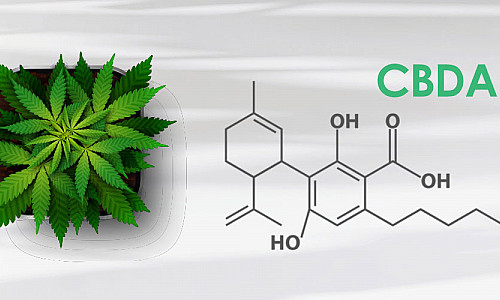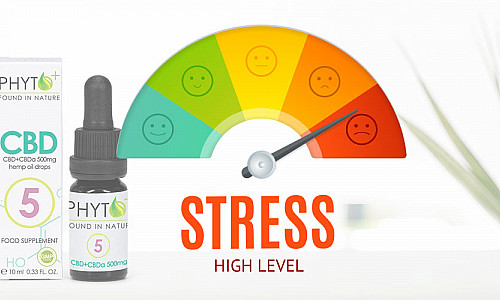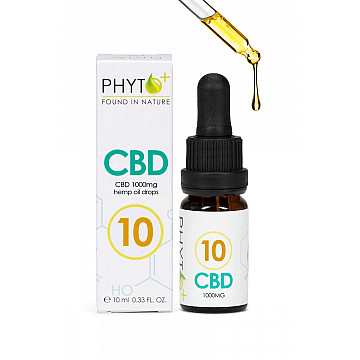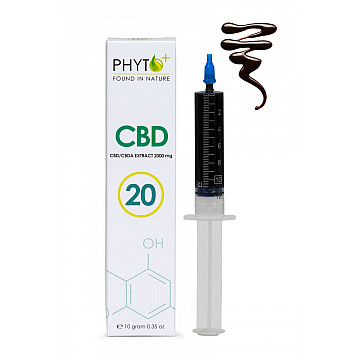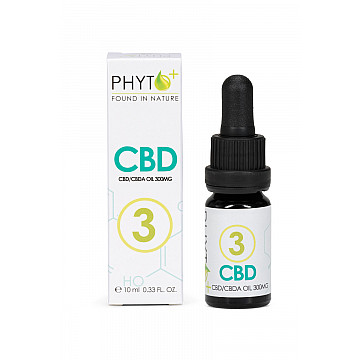
Chronic migraine is a condition that can truly take over your life. It's as if you're constantly battling that debilitating headache that haunts you daily. I mean, it's really not to be underestimated. And you'll be amazed at just how widespread it actually is. According to the World Health Organization (WHO), migraines rank among the most common neurological disorders globally. Incredible, isn't it?
Now, it's tricky to provide precise numbers, but estimates suggest that more than one billion people worldwide suffer from migraines. Just think about that - one billion! It doesn't matter your age, gender, or background; migraines can strike anyone. It's a challenge we all share.
But you know what? There's a glimmer of hope on the horizon. And it comes in the form of CBD oil. Yes, you read that right. More and more people grappling with migraines have discovered that CBD can assist them. It offers potential benefits that can make a world of difference in the lives of people like you and me. And that's truly something to be thankful for.
Reading time: +/- 7 minutes
Contents of this Blog
- Is Headache the Same as Migraine?
- What Are the Symptoms of Migraine?
- CBD and Migraine: How Does CBD Work?
- How Can CBD Help You with Migraine?
- What CBD Oil Dosage is Suitable for Your Migraine Relief?
- What Do the Studies Say?
Is Headache the Same as Migraine?
I want to make an important distinction because headaches and migraines are not actually the same. Don't get me wrong, migraine is, in fact, a form of headache, but there are some crucial differences between the two.
Headache is a fairly broad term used to describe all sorts of pain or discomfort in and around the head. It can be caused by various factors like tension, fatigue, sinus issues, or other medical conditions. The intensity and duration of a headache can vary significantly, from a mild, dull ache to an intense throbbing sensation.
On the other hand, we have migraine, a specific type of headache that stands out due to recurrent bouts of moderate to severe pain. But that's not all. Migraine is often accompanied by other symptoms that make it even more challenging. Think of nausea, sensitivity to light and sound, and sometimes even auras, which are visual or sensory disturbances that occur before the actual attack. It's important to understand that migraine is not just an annoying headache; it's considered a neurological condition that can have a significant impact on daily functioning and the overall quality of life for those dealing with it.
So, the next time someone claims that a headache and migraine are the same, you can say with a smile, 'Not quite, my friend. There's more to it than just an annoying headache.
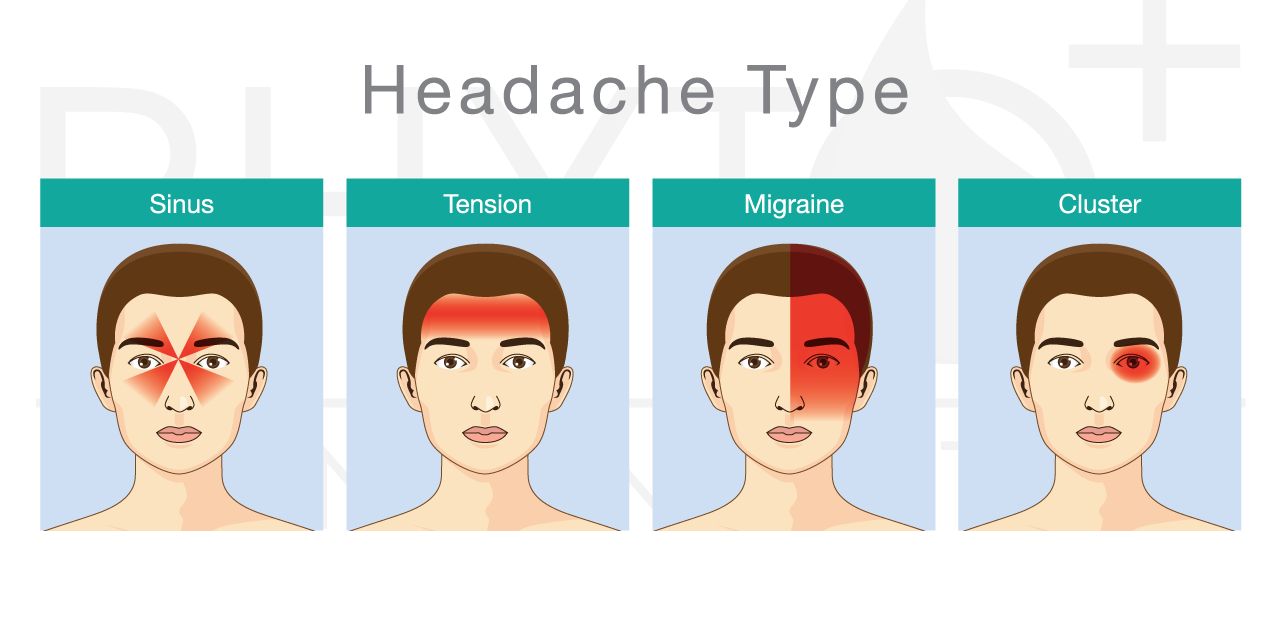
This image displays various types of headaches, with migraines characterized by one-sided facial pain. 1. Sinus (cold) headache, 2. Tension headache, 3. Migraine, 4. Cluster headache.
What Are the Symptoms of Migraine?
Let's take a moment to explore the various symptoms that can accompany migraine because it can vary from person to person. While everyone has their unique experience, there are some common symptoms that many may encounter.
First and foremost, there's that intense headache that often comes with migraines. It feels like there's a throbbing, pulsating pain that can last for hours to days. Typically, the pain is focused on one side of the head, but sometimes it can affect both sides. It's genuinely overwhelming.
And then there's the sensitivity to light and sound, something many people with migraines struggle with. Bright light or loud noises can worsen the symptoms and even trigger or intensify a migraine attack. So you often see people with migraines wearing sunglasses or seeking solace in a quiet, dark room to find some relief.
But it doesn't stop there. Nausea and vomiting are also common companions of migraine. It can really take a toll on your stomach. These gastrointestinal discomforts only compound the situation.
Some people also experience auras, which occur before or during a migraine attack. Auras are often visual disturbances, like seeing flashing lights, blind spots, or zigzag lines. However, they can also involve other sensory changes or even impact someone's ability to speak. It's quite distressing, to be honest.
Migraines can also lead to fatigue and physical weakness. Even after the headache has subsided, you can feel drained and feeble. It's as if your energy has been sapped away.
And let's not forget about cognitive issues, commonly known as 'brain fog.' Migraine can affect your cognitive functioning. Some people experience difficulty concentrating, confusion, or decreased memory during an attack. It's as if your thoughts get entangled in a fog.
Of course, it's important to note that not everyone with migraine will experience all these symptoms, and the severity and duration can vary. But if you or someone you know regularly experiences headaches with these characteristics, it's wise to consult a healthcare provider for an accurate diagnosis and appropriate treatment. You're not alone, and there are options that can help you manage migraines and regain control of your life.
The text continues below this video.
CBD and Migraine: How Does CBD Work?
When we talk about migraine and potential solutions, CBD, or cannabidiol, is increasingly coming into the spotlight. Cannabidiol is one of the many active compounds, known as cannabinoids, found in the cannabis plant. What's interesting about CBD is that it doesn't have psychoactive effects, unlike, for example, marijuana oil or medicinal cannabis. CBD oil contains only a minimal amount of THC (0.05%), which means you can't get 'high' from it.
But how does it work exactly? Well, cannabidiol is known for its interaction with the endocannabinoid system (ECS) in our bodies. You might be thinking, 'The endocannabinoid system? I've never heard of that.' No worries, I'll be happy to explain.
The ECS is a complex network of receptors in our bodies involved in various physiological processes. Here's how it works: Our bodies naturally produce chemical compounds called endocannabinoids, which transmit signals to cells through receptors. These receptors act as receivers and relay the signals to the appropriate cells. Enzymes then help break down the endocannabinoids once they've served their purpose.
The endocannabinoid system plays a crucial role in regulating various functions such as pain, mood, appetite, sleep, and our immune system. It helps maintain balance in our bodies, which we call homeostasis.
Now, enter CBD. Cannabidiol and other phyto-cannabinoids from the cannabis plant can influence the ECS in the same way as the endocannabinoids produced by our bodies. As a result, they can impact various processes in our bodies, similar to natural endocannabinoids.
So, when it comes to alleviating migraines, CBD can play a role by acting on the endocannabinoid system. It can help restore balance and relieve symptoms. It's fascinating how the interaction between CBD and our bodies can contribute to reducing the impact of migraines.
Please note that seeking advice from a healthcare provider before using CBD for migraine treatment is always advisable.
How Can CBD Help You with Migraine?
Let's take a closer look at how CBD oil can potentially help in various ways. First and foremost, it may have anti-inflammatory properties, which is a crucial aspect for me. We know that migraine attacks are often associated with inflammation in the blood vessels of the brain, and CBD may be able to reduce these inflammatory responses. That sounds promising, doesn't it?
Another intriguing aspect is that research suggests CBD can influence pain perception. And believe me, migraines can be quite painful and have a significant impact on your daily life. However, with CBD, it might be possible to alleviate or even reduce that pain. I can imagine how much relief that could offer.
Furthermore, there's another positive aspect: CBD may potentially reduce the frequency of these attacks. While the exact mechanism isn't entirely clear, there are indications that CBD can impact serotonin regulation in our brains. Serotonin plays a crucial role in our mood and sleep patterns, and disruptions in this system are linked to migraines. So, CBD may help normalize serotonin levels, reducing the occurrence of an attack. It's not the same for everyone, but it's certainly worth trying.
It's essential to remember that everyone's response can be different, and results may vary. It may be necessary to experiment with different dosages and concentrations to discover what works best for your individual situation.
What CBD Oil Dosage Is Suitable for Your Migraine Relief?
Let's explore finding the right amount of CBD to relieve your migraine. It's essential to remember that everyone can react differently to CBD, so it may take some time and experimentation before you find the optimal dosage for your situation.
As a starting point, it's recommended to begin with a CBD oil with a concentration of at least 5%. That's 500 milligrams of CBD per 10ml bottle. This concentration is often suitable for beginners and provides a good balance between effectiveness and potential side effects. If you find that the CBD oil 5% doesn't have the desired effect, you can always consider switching to a stronger concentration. Another option to consider is CBD capsules, which are convenient to use. However, keep in mind that the effect of capsules may take longer since they need to pass through the digestive system before being absorbed into your system.
Start with a low dose of CBD oil and gradually increase it until you achieve the desired effect. It's essential to be patient as it may take some time to find your ideal dosage.
If you want to buy CBD oil, it's also wise to ensure that the CBD product comes from a reputable source. Preferably choose a well-known brand like Phyto Plus®, which offers quality and tested products. This helps ensure that the product is free from contaminants and consistent in quality.
However, keep in mind that CBD products are not a substitute for medical advice. If you regularly suffer from severe migraines, it's advisable to consult a doctor for personalized treatment and guidance on using CBD. Your doctor can assist you in finding the most suitable amount and the right approach for your individual needs.
What Do the Studies Say?
Studies have examined the effectiveness of CBD in treating migraines and have shown promising results.
In a study published in 2017 in the journal Cannabis and Cannabinoid Research, titled 'Cannabinoids suitable for migraine prevention,' the use of cannabinoids, including CBD, was investigated for the treatment of chronic migraines. Researchers found that out of 121 participants, as many as 103 reported a reduction in the frequency of migraines when using medicinal cannabis. It's important to note that this study did not specifically focus on CBD alone.
Another promising study, published in 2020 in the Journal of Clinical Medicine, specifically examined the use of CBD oil as a preventive treatment for migraines. The study included 48 participants suffering from chronic migraine attacks. After three months of CBD treatment, the researchers observed a significant reduction in the frequency of migraines, with an average decrease from 10.4 to 4.6 migraines per month. Additionally, participants reported an overall improvement in their quality of life.
These studies indicate that CBD may be promising in the treatment and prevention of migraines. However, it's important to note that more research is needed to determine the full effectiveness and optimal dosage of CBD oil for migraines. It's always wise to seek advice from a healthcare provider before using a CBD product as part of your migraine treatment.
Journal of Cannabis Research - 2020 - Motivations and expectations for using cannabis products to treat pain in humans and dogs: a mixed methods study
Cannabis and Cannabinoid Research - 2023 - Potential Utility of Cannabidiol in Stress-Related Disorders
National Library of Medicin - 2023 - Characterization of the biochemical and behavioral effects of cannabidiol: implications for migraine


